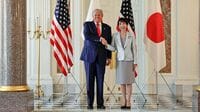TOKYO (Reuters) - Tokyo governor Yuriko Koike on Wednesday formally launched a new party promising conservative reform, stepping up her challenge to Prime Minister Shinzo Abe and adding to uncertainty about the outlook for a general election widely expected next month.
But the popular former ruling party lawmaker, who is already upstaging Abe in the media and complicating forecasts, said she herself would not seek a seat in parliament's lower house now.
Abe said on Monday he would call the snap election to reset his mandate, betting that his Liberal Democratic Party (LDP) and junior coalition party can keep their majority in parliament's lower house, where they hold a two-thirds "super majority".
Abe will dissolve the lower house on Thursday for a vote expected on Oct. 22.
At a news conference launching her "Party of Hope," Koike repeated promises to form a party without ties to vested interests in order to "reset Japan."
"If at this time we don't reset Japan, we won't be able to sufficiently protect our international competitiveness and national security," said Koike, a former defence minister who quit the LDP earlier this year.
There had been speculation that Koike would choose to run in the election herself, but she said she would remain in her position as governor.
Koike's new party is staking out a policy space similar to that of the conservative LDP and the right-wing of the main opposition Democratic Party, a mixture of conservatives and liberals.
But her calls for open government, a freeze on a planned sales tax hike from 2019, an end to nuclear power and a promise to promote diversity give it a more populist tinge.
The Nikkei business daily reported on Wednesday that Koike's party was in merger talks with the Democrats and she had met with Democratic Party leader Seiji Maehara on Tuesday for discussions, but Koike made no reference to the issue.
The Nikkei said prospects for a merger were uncertain, since Koike has suggested she was not keen and the move could trigger a split in the Democratic Party. The party has been struggling with single-digit support rates and several members have defected to run for Koike's new party.
The Democrats have also been in talks with the Japanese Communist Party about cooperating to run unified candidates but conservatives, including Maehara, are wary of that strategy.
Koike, 65, defied the LDP to run successfully for the Tokyo governorship a year ago and fielded candidates who routed the LDP in an election for the metropolitan assembly in July.
Koike has said she aimed to push reformist policies, open government and an end to reliance on nuclear power.
She has also called for a freeze on a plan to raise the national sales tax to 10 percent from 8 percent in 2019. Abe said he would go ahead with the tax hike and spend some of the revenue on education and child care.
Abe's decision to go to the polls is seen as an effort to take advantage of confusion in the opposition camp and an uptick in his support rates, which have rebounded to around 50 percent amid jitters over North Korea's nuclear and missile programmes.
His support had fallen below 30 percent in July due to suspected cronyism scandals.
(Reporting by Linda Sieg and Elaine Lies; Editing by Simon Cameron-Moore)



